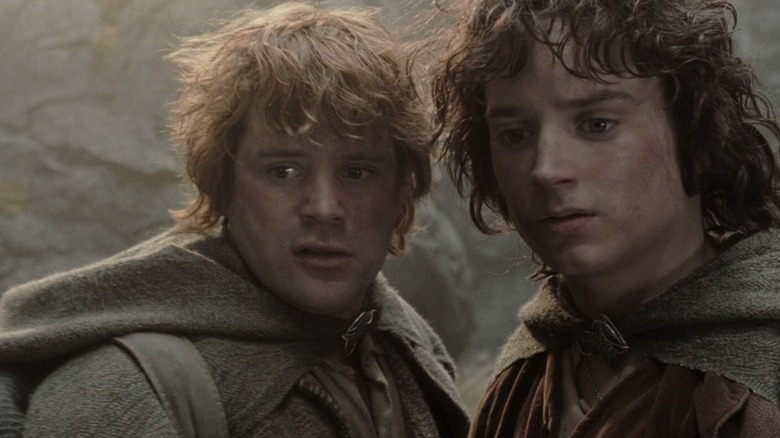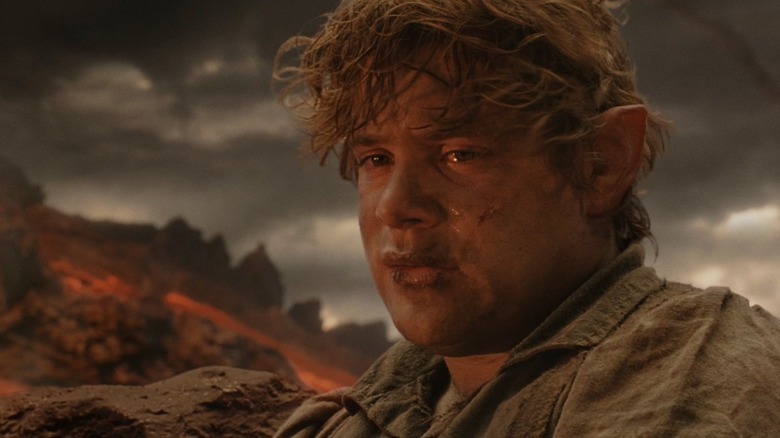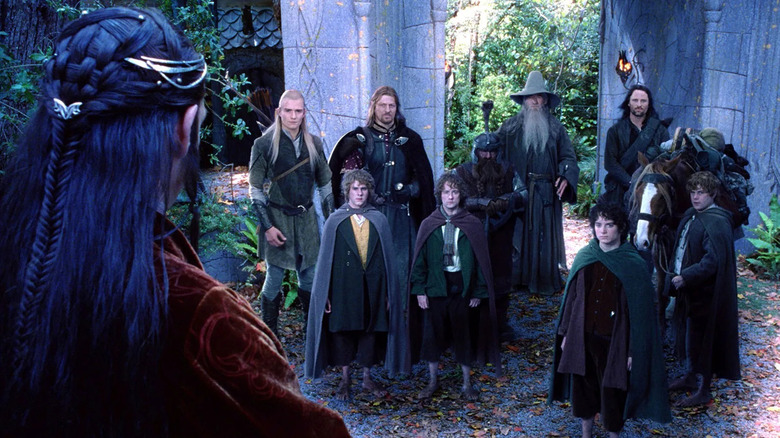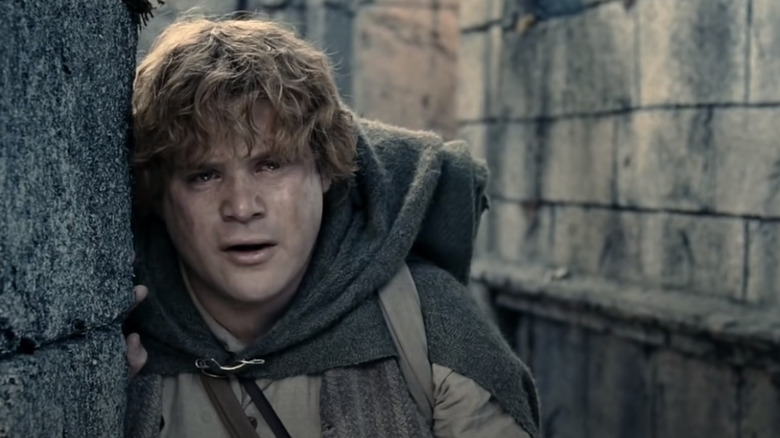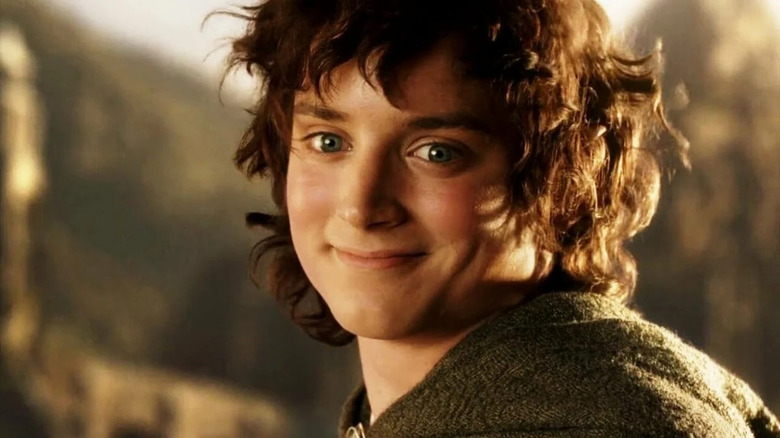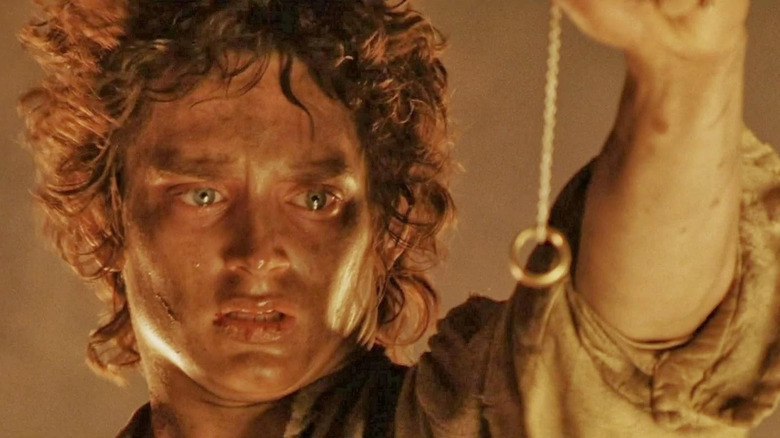Sean Astin Doesn't Agree With Fans Who Think The Lord Of The Rings' Hero Is Sam
Finding noble heroes and leaders in unlikely places is a theme central of J.R.R. Tolkien's "The Lord of the Rings" trilogy. It's the reason his tale opens with a visit to the Shire and an introduction to a curious group of Middle-earth residents: Hobbits. As Bilbo Baggins puts it in "The Fellowship of the Ring," these were a race that was "neither renowned as great warriors, nor counted amongst the very wise," making them an unassuming choice of protagonists for Tolkien's tale.
But all four Hobbits that set out from the Shire at the beginning of the trilogy break those stereotypes one way or another. Arguably the most important of any that appear in the films are Frodo Baggins (Elijah Wood) and Samwise Gamgee (Sean Astin). It's the bond between these two friends, one an orphan and the other his gardener, that ultimately leads to Sauron's downfall with the destruction of the One Ring.
Obviously, as the ring bearer, Frodo carries the brunt of the burden. But as he says at the end of "The Two Towers," he wouldn't have made it far without Sam. Which has led some fans to think that maybe Sam is the real hero of the story — the one who gets Frodo to Mount Doom through sheer will and unparalleled loyalty. But that theory doesn't fly with at least one very important person related to this story: Astin himself.
Frodo's story or Sam's?
Back in 2003, Astin was asked to comment on the theory that "The Lord of the Rings" wasn't Frodo's story but Sam's during an interview with Seattle Pacific University Magazine. "I don't agree really with that," the actor replied. "To me, I was the advocate for Sam. I am the ambassador of Sam. In my interpretation of Sam, I wanted to be strong." But that strength -– a resilience in the face of many obstacles which that mirrors Frodo's against the ring -– isn't meant to overshadow the burden of the ring-bearer, Astin said.
According to him, it all comes down to the personal toll the journey exacts on each of the fellowship members. "I think that Frodo sacrifices more than Sam ... by degrees," Astin continued.
The Lord of the Rings is filled with individual heroes
Nearly two decades later, Astin still firmly believes that there really isn't just on hero in "The Lord of the Rings" trilogy. He told ComicBook.com that despite the "fervent" and "all-consuming" passion of fans to enshrine Sam as the "real hero" of the story, it's important to remember it all started with the fellowship. Nine different people pledging their lives to protect the ring bearer is no small feat, after all. Astin explained:
"I am always compelled to contextualize for them that there were at least nine nominal heroes of the Fellowship and then you've got lots of others who were integral to the story, the success of the journey to defeat Sauron. I think people have a natural tendency to root for the underdog. That's why the Hobbits are so compelling. Because who would expect these little creatures to carry the fate of the world on their shoulders?"
All four Hobbits share this burden and overcome it, proving their courage and valor — which explains why fans of Sam are so ardent in highlighting his arc in both the books and films. Like his friend, Frodo is also an underdog, and it's their camaraderie that ensures they succeed in destroying the One Ring, so arguing which is the "real hero" seems rather besides the point.
Astin thinks Sam wouldn't want to be the hero
Comparing the sacrifices of Frodo and Sam is a lot like comparing apples to oranges, but more importantly crowning the latter hero is pretty counter to the character. "I think that Sam wouldn't have wanted to be thought of as the hero of the story," Astin told Seattle Pacific University Magazine. "Tolkien saw Sam as his surrogate [and] I think Peter [Jackson] does, too."
The scene that comes to mind is Sam's monologue in "The Two Towers" — one of the real tear-jerkers of the whole trilogy — in which he wrestles with the futility of trying to accomplish an impossible quest while also holding on to the grand heroics of the great stories he used to hear as a child. It's a scene designed to remind us that Sam is the regular person drawn into the conflict, making him the perfect character for the reader and audience to relate to.
But according to Astin, declaring Sam the hero of "The Lord of the Rings" downplays a crucial part of the trilogy: the ring-bearer's journey.
Astin doesn't want to downplay Frodo's sacrifices
Astin told ComicBook.com that when hears people trying to make their cases for Sam over Frodo, he can't help but "cringe." He said he tries to just be thankful about them knowing he's also in the movie, but it irks him to think maybe some people are missing the point. The big one is Frodo's sacrifice which, as Astin pointed out, thematically aligns with that of a Christ figure. "With Christ, there's a cross and nails that go through their hands and feet and the crown of thorns and blood coming down the head," he explained. "With Frodo, it's the same type of journey. He's a Christ type figure and he sacrifices his immortal soul, maybe not completely, but you know something is lost, it can't be regained."
That ties into why Frodo leaves Middle-earth at the end of "The Return of the King," but not before dropping one of the most heartbreaking lines in the whole trilogy. Trying to explain himself, he tells his fellow Hobbits they succeeded in saving the Shire. "But not for me," Frodo then tells a teary-eyed Sam.
Sauron is defeated. But like his wound at Weathertop, Frodo will carry the scars of his ring-bearing days all his life. It's a bittersweet moment, and one that underscores the lasting collateral damage that inevitably follows any conflict — regardless of the outcome. For Frodo, that plays out on an individual scale, and it's always devastating to watch.
Showing Frodo's struggle with the ring was a difficult task
What makes the "Sam is the real hero" theory interesting, though, is that it brings up the challenge of visually portraying Frodo's struggle versus the rest of the fellowship. Aragorn, Gimli, Legolas — even Merry and Pippin -– all of them are swept up in various battles. But Frodo and Sam's struggle, though still physically taxing, is much more internal. Astin told Seattle Pacific University Magazine:
"One of the biggest challenges was dramatizing the sacrifice of Frodo and the torment of Frodo. Short of having Elijah [Wood] get addicted to heroin or starving him for months on end, how does a serious committed actor communicate [that idea]? [It's the same] with Gollum who is supposed to be the real expression of those ideas in the extreme – he has to be animated, because you want to service that gaunt, emaciated, tormented idea. In the writing, in the literature, you can go into these ideas."
All of this is, of course, a credit to Wood's acting. If there's one thing Jackson's trilogy got right, it was in casting actors that embodied in appearance and spirit all of Tolkien's characters. Wood was no exception, and his ability to non-verbally convey the increasing weight of the ring around his neck is a vitally important piece of the trilogy. Not to mention the most emotionally intense; the moment he succumbs to the ring inside Mount Doom is downright a flawless example of this, and his corrupted, diabolical smile helps underscore the idea that part of his soul has been eaten away by the weight of his burden. So for Astin, even though Sam gets his share of heroic moments ("But I can carry you!"), he prefers to look at Sauron's destruction as more of a team effort.
